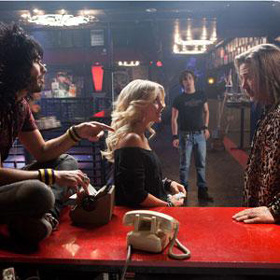Rock of Ages

4/5
Having proved to be a dab hand at transitioning musicals from stage to screen with Hairspray, former dancer and choreographer-turned-director Adam Shankman was the logical choice to adapt the runaway Broadway hit Rock of Ages into a jukebox musical unashamedly celebrating the wide-eyed exuberance of hair metal’s heyday. While many pondered how this could possibly end up as anything other than a hugely expensive exercise in overblown camp, Shankman has opted to wring the irony right out of the thing and play it absolutely straight, having the picture surf the wave of its own sincerity.
Rock of Ages is not a send-up, nor is it a tongue-in-cheek acknowledgment of the inherent, absurd contradictions of era (guys with an entourage that would make a rapper blush crooning about what rugged lone wolves they are). No, this is straight-up reverence entirely devoid of satire. That approach certainly suits the many song-and-dance set-pieces, where it is almost impossible not to punch your fist into the air (or at the very least wave a lighter around), but it does make the quieter moments all the more chucklesome, because the central pillar of Rock of Ages is the most clichéd version of boy-meets-girl you could possibly imagine.
Julianne Hough is the impossibly named Sherrie Christian, who literally steps off the bus from Oklahoma with a denim jacket, a suitcase full of dreams, and stars in her eyes. Barback Diego Boneta is the wannabe singer who hooks her up with a job at the Bourbon Room. While the two make eyes at each other as she chases the brass ring while steadfastly refusing to debase herself in the seedy underbelly of Los Angeles. He, beguiled by her, somehow manages to pen, of all things, a little ditty he calls “Don’t Stop Believin’.”
Upstairs owner Dennis Dupree (Alec Baldwin) and his club manager and best friend, Lonney (an off the hook and off the leash Russell Brand) fret over the financial future of the Bourbon Room, which can only be saved by a titanic gig from rock god Stacee Jaxx (Tom Cruise). Across the street the mayor’s ultra-conservative wife (Catherine Zeta Jones) leads a picket line of outraged Stepford Wives determined to conspire to shut the club down permanently. While the plot is threadbare and exists solely to facilitate one broadly metaphorical ballad after another (protestors belt out a rendition of “We’re Not Gonna Take It” to which Lonny and club patrons respond with “We Built This City”) the clear and demonstrable devotion to the subject matter is strangely intoxicating.
With Shankman denying his cast any permission to wink at the camera, essentially giving them nowhere to hide, the ensemble are left with little option but to hug the material tightly for all they’re worth, and it’s a strategy that works. While they’re all certainly worthy of a giggle or two, no character ever seems to be chasing the gag of their costume, or their wig, or any prop-employed-as-a-crutch that might prove gimmicky. The best moments are certainly the musical numbers, with Cruise’s hugely impressive set of pipes proving him to be anything but stunt casting and his duet of “I Want to Know What Love Is” with Malin Akerman’s Rolling Stone reporter is all kinds of raunchy. Baldwin’s twirling bromance duet with Brand to the tune of “Can’t Fight This Feeling” is another matter entirely, but they can’t all be home runs now can they?
In addition to being oddly infectious, Rock of Ages is also laugh-out-loud funny, with Brand unleashed to maximize his improv potential and Bryan Cranston indulging his gifted comedic side (people talk so much about Breaking Bad they often forget how good he was in Malcolm in the Middle). Given the gifted cast it’s ironic that the picture is stolen wholesale by a monkey – Stacee Jaxx’s groupee ‘Heyman’ – who stands as perfectly emblematic of the worst of eighties excess, dressed like Gaddafi and offering a nice, obliging line in the trashing of appropriate locales when Jaxx is too drunk/stoned/tired to do so himself.
Rock of Ages stands as an unapologetic celebration of a subculture railing proudly against the encroachment of commercialized, commoditized boyband tat. Unfortunately, as anyone who lived through the nineties duly remembers, the tat won.
RELATED ARTICLES
Get the most-revealing celebrity conversations with the uInterview podcast!





Leave a comment